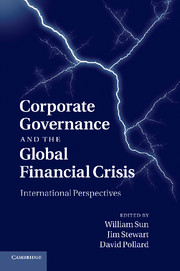Book contents
- Frontmatter
- Contents
- Figures
- Tables
- Contributors
- Acknowledgements
- 1 Introduction: rethinking corporate governance – lessons from the global financial crisis
- Part I The failure of the market approach to corporate governance
- 2 Corporate governance causes of the global financial crisis
- 3 The failure of corporate governance and the limits of law: British banks and the global financial crisis
- 4 Where was the ‘market for corporate control’ when we needed it?
- 5 Information asymmetry and information failure: disclosure problems in complex financial markets
- 6 Finance, governance and management: lessons to be learned from the current crisis
- Part II Ownership, internal control and risk management: the roles of institutional shareholders and boards
- Part III Post-crisis corporate governance: the search for new directions
- Index
- References
4 - Where was the ‘market for corporate control’ when we needed it?
Published online by Cambridge University Press: 05 August 2011
- Frontmatter
- Contents
- Figures
- Tables
- Contributors
- Acknowledgements
- 1 Introduction: rethinking corporate governance – lessons from the global financial crisis
- Part I The failure of the market approach to corporate governance
- 2 Corporate governance causes of the global financial crisis
- 3 The failure of corporate governance and the limits of law: British banks and the global financial crisis
- 4 Where was the ‘market for corporate control’ when we needed it?
- 5 Information asymmetry and information failure: disclosure problems in complex financial markets
- 6 Finance, governance and management: lessons to be learned from the current crisis
- Part II Ownership, internal control and risk management: the roles of institutional shareholders and boards
- Part III Post-crisis corporate governance: the search for new directions
- Index
- References
Summary
A totally unfettered market for corporate control is literally all that is needed for near ideal corporate governance.
(Manne, 2008, p. 14)The 2008 banking crisis was the result of ‘a perfect storm of economic conditions’ (Lipton et al., 2008, p. 1) which included the subprime mortgage crisis, the property collapse, the liquidity crisis, market volatility and an accommodating accounting and regulatory environment. Most commentators also agree that corporate governance failings played a contributory role. In particular, there has been widespread criticism of the chronic and reckless risk-taking by management, which was fuelled by the banks’ remuneration policies. A myriad of reports and recommendations have identified these failings and proposed solutions to ensure that these same mistakes are not repeated.
- Type
- Chapter
- Information
- Corporate Governance and the Global Financial CrisisInternational Perspectives, pp. 75 - 94Publisher: Cambridge University PressPrint publication year: 2011



